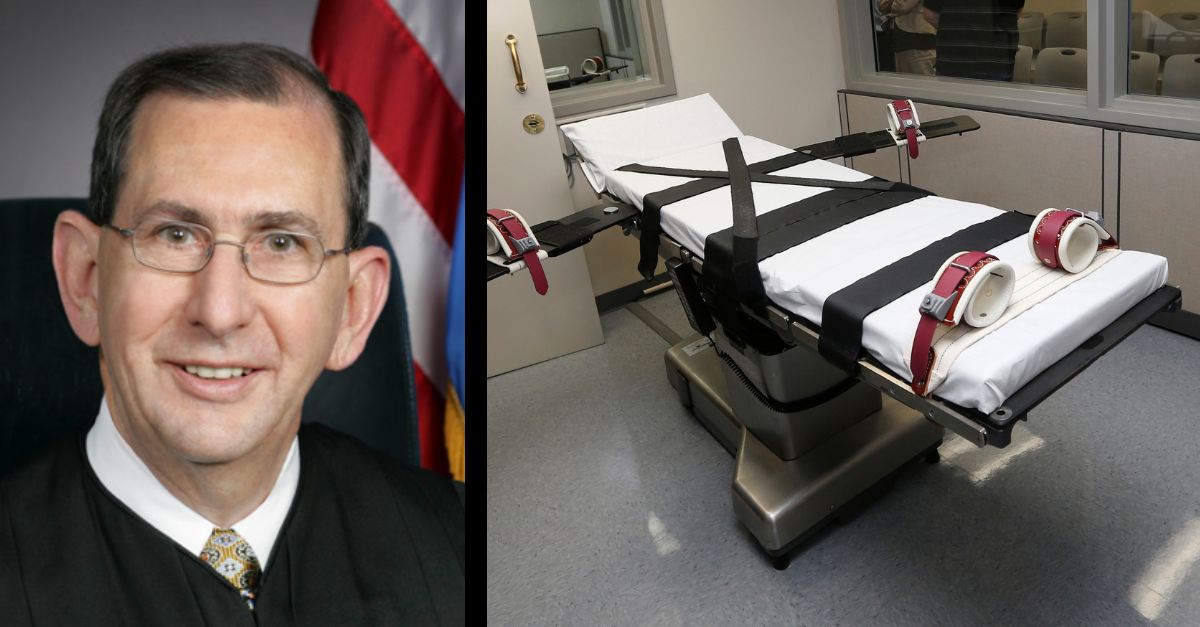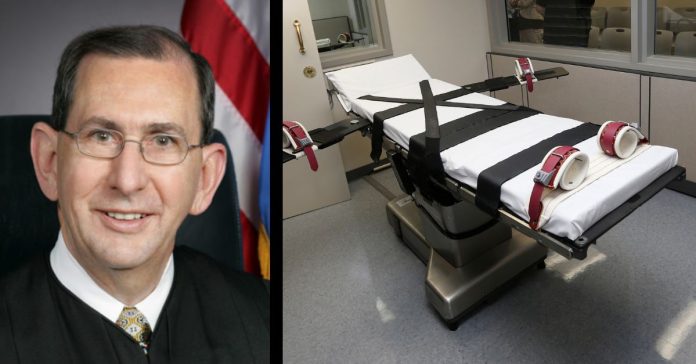
Left: Oklahoma Court of Criminal Appeals Judge Gary Lumpkin (Photo via Oklahoma Court of Criminal Appeals). Right: FILE – This Oct. 9, 2014, file photo shows the gurney in the execution chamber at the Oklahoma State Penitentiary in McAlester, Okla. (AP Photo/Sue Ogrocki, File).
An Oklahoma Court of Criminal Appeals judge said in open court that rather than pacing executions far enough apart to give corrections staff time to recover from an “unsustainable” pace of back-to-back deaths, the employees involved should simply “man up” and “suck it up.”
An audio recording of Judge Gary Lumpkin’s rather unsympathetic remarks is available here.
At a hearing Tuesday, the judge responded to Oklahoma Attorney General Gentner Drummond’s official request to extend the time between executions to 90 days in an effort to reduce the strain on corrections staff. Drummond, a Republican, is the same attorney general who made headlines when, during his 2018 political campaign, he featured photos of murdered University of Iowa student Mollie Tibbetts in a segment that said “illegal aliens” are committing “the most heinous crimes.
In January 2023, Drummond filed a motion about the upcoming executions of Richard Eugene Glossip, Jemaine Monteil Cannon, Anthony Castillo Sanchez, Phillip Dean Hancock, James Chandler Ryder, Michael Dewayne Smith, and Wade Greely Lay. Drummond said in the filing that in the preceding fifteen months, the Department of Corrections (DOC) successfully carried out eight executions while “exhibiting work ethic, professionalism, and concern for the victims’ families throughout.”
“As is to be expected, DOC leadership and personnel have continuously sought to learn and improve during this process,” Drummond noted.
The attorney general’s commendations for DOC staff were more than boilerplate language in a court filing — they were representations made against the backdrop of a series of highly problematic executions in Oklahoma.
In July 2022, Oklahoma resumed executions after six-year hiatus; its Court of Criminal Appeals set execution dates for six new inmates — 25 of the 43 people then on death row — and scheduled executions one per month through December 2024. The reason for Oklahoma’s six-year freeze on executions was that just hours before inmate Richard Glossip was to be executed in 2015, prison officials realized they received the wrong lethal drug.
Glossip’s execution was paused, then additional investigation revealed that the same incorrect drug had been used in the botched execution of Clayton Lockett earlier the same year. Lockett’s execution was stopped midway when he began to groan, convulse, and speak during the process. Lockett suffered a heart attack and died 43 minutes later.
In Drummond’s motion requesting additional time between executions, he did not specifically refer to the myriad problems in the state’s recent executions, but said that it had, “become clear over time is that the current pace of executions is unsustainable in the long run, as it is unduly burdening the DOC and its personnel.”
“This is especially true given the extensive and intensive nature of the training DOC personnel undergo to prepare for each execution,” Drummond said in the motion.
“I do not want, as the chief law officer, to oversee a failed execution,” Drummond argued to the court during the hearing. “I am present with every execution. I look the defendant in the eye as he dies.”
“I look the men and women that administer those lethal injections in the eye after they’ve administered it, and I have sympathy for the strain on them,” the attorney general added.
Lumpkin was overtly unreceptive.
“I’m sorry, but I come from the Marine Corps, and when we have tough duties, we just say, ‘man up.’ If you can’t do the job, you step aside and let somebody do it that can,” Lumpkin demanded of Drummond, who was an Air Force captain awarded the Distinguished Flying Cross for his service during the Gulf War.
“We set a reasonable amount of time to start this out, and y’all keep pushing it and pushing it and pushing it,” Lumpkin scolded Drummond at the hearing. “Who’s to say next month you won’t come in and say I need 120 days? This stuff needs to stop, and people need to suck it up, realize they have a hard job to do, and get it done in a timely, proficient, professional way.”
Lumpkin insisted, “I’m not trying to be macabre or anything of that nature,” but said the legislature imposed the duty to carry out executions on corrections staff. Lumpkin also argued that if leaders from 2001-2003 could carry out their duties “without a hitch,” then current staff should be able to carry out multiple executions in “a logical, reasonable and timely way.”
At no time during the colloquy did Lumpkin address the state’s problematic history of carrying out executions — nor did he mention that Richard Glossip’s execution has already been rescheduled eight times and currently has an appeal pending before the U.S. Supreme Court.
“It doesn’t make sense to me,” said about Drummond’s request to space out executions. “I’ve seen other people do their job without all the sympathy talk, because they have to man up and do their job.”
“It’s almost like we’re being pushed — and I’m sorry for the analogy — but the only analogy I can come up with is the undisciplined child that keeps pushing the envelope,” Lumpkin ended his remarks from the bench.
Extensive research has revealed that court and prison staff often suffer severe and persistent trauma as a result of being required to participate in actual and mock executions. Over at least the last decade, many have denounced use of the phrase “man up,” as an offensive perpetuation of gender-based stereotypes and a dangerous call to ignore mental health needs.
Lumpkin has not yet ruled on Drummond’s request for extended time between executions.
Lumpkin took the bench as an elected judge on the Oklahoma Court of Criminal Appeals in 1989. His current term ends on Jan. 11, 2027, after being reelected in 2020.
Have a tip we should know? [email protected]

